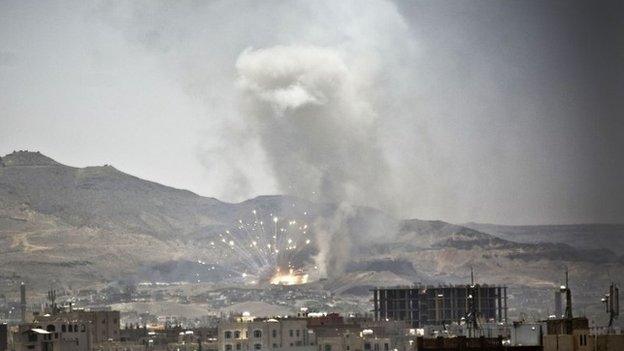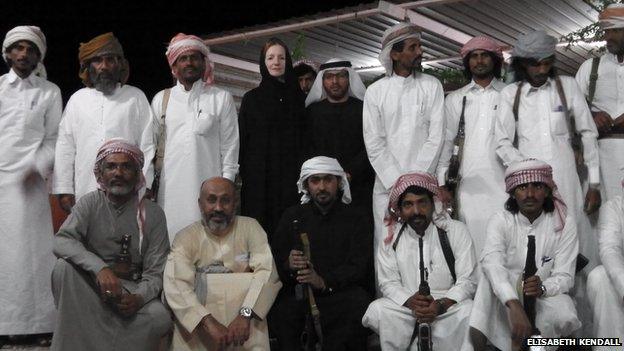How does al-Qaeda attract Yemenis?
- Published

The conflict in Yemen is allowing al-Qaeda to expand its reach in the country
Despite vast sums spent on counter-terrorism operations in Yemen, al-Qaeda has continued to grow in the country. Oxford University analyst Elisabeth Kendall looks at how the group has achieved this.
Al-Qaeda has certainly taken advantage of the recent collapse of Yemen's government and subsequent war to expand its influence.
Last month about 300 al-Qaeda militants escaped from one prison, external alone and proceeded to take over the eastern city of Mukalla.
Al-Qaeda has also drawn strength from alliances with tribes in Yemen's south and east in a marriage of convenience to combat the advances of their common Houthi enemy.
But even in the years leading up to the current crisis, al-Qaeda's numbers were estimated to have tripled.
How did this occur in the face of the group's steady losses owing to drone strikes and its own suicide operations?

'Robin Hood'
An important part of al-Qaeda's persistent appeal over recent years lies in what it does when it is not busy waging violent jihad or churning out position statements and theological treatises.
While analysts tend to focus on the latter, or on recruitment activities inside prisons or mosques, locals are more likely to be enticed by al-Qaeda's mix of soft-culture approaches.
Al-Qaeda facilitated its outreach programme through introducing the Ansar al-Sharia brand in 2011. The name, meaning Supporters of Islamic Law, can be more easily equated with pure Islamic aims and a locally-geared agenda free from any controversial baggage attached to al-Qaeda's global brand.
In its central and eastern strongholds, al-Qaeda has reached out to disadvantaged communities by providing basic services such as water, electricity and education.
Despite the vast amounts of aid that have flowed into Yemen over recent years, £185m ($282m) of it from the UK alone, rampant corruption prevents the benefits of it filtering down to many of those in greatest need.
This can give al-Qaeda a Robin Hood-like appeal or at least mean that it is tolerated, even by those who do not share its strict interpretation of Islamic law.
Enticements
Securing tolerance in its tribal heartlands is vital for al-Qaeda's outreach programme.
As one local from Mukalla explained: "What do you expect us to do? Fight them? They are our kinsfolk. We let them go about their business."
Who's in charge in Yemen? Explained in 90 seconds
Tribal structures can offer al-Qaeda protection and can inadvertently produce a pyramid-like recruitment model, since potential sympathisers are best approached by someone they know and respect.
Al-Qaeda tends to field relatively young leaders with whom impressionable youths can more easily identify.
Young men from Yemen's east have told of being lured by camping trips, offers of help with their studies and sports activities, during the course of which religious discussion naturally features as potential sympathisers are groomed.
The ensuing sense of camaraderie and righteous common purpose is seductive, particularly when it comes with cars, weapons and money.
Yet as al-Qaeda's power grows, it can afford to turn to more bullying tactics. In the eastern city of Mukalla, reports are already circulating of al-Qaeda gangs snatching young men off the streets.
But it hasn't resorted to the same level of intimidation used by al-Qaeda in Syria - yet.
In fact, there is evidence to suggest that heavy handed tactics provoke local resistance.
At the same time, in what might ironically be termed a recent charm offensive, al-Qaeda has dissociated itself from the savage brutality of Islamic State and apologised for its own beheadings of soldiers and killing of unarmed health workers last year.
This spells bad news for counter-terrorism efforts in two ways. First, it broadens al-Qaeda's appeal among sectors of the population increasingly desperate to counter Houthi advances on the ground.
Second, it pushes al-Qaeda's most extreme elements into the arms of Islamic State, which also appears to be growing in Yemen amid the current chaos. In late April it released its first video from Yemen.

Who is fighting whom in Yemen?
Houthis - The Zaidi Shia Muslim rebels from the north overran Sanaa last year and then expanded their control. They want to replace Abdrabbuh Mansour Hadi, whose government they say is corrupt. The US alleges Iran is providing military assistance to the rebels.
Ali Abdullah Saleh - Military units loyal to the former president - forced to hand over power in 2011 after mass protests - are fighting alongside the Houthis.
Abdrabbuh Mansour Hadi - The president fled abroad in March as the rebels advanced on Aden, where he had taken refuge in February. Sunni Muslim tribesmen and Southern separatists have formed militia to fight the rebels.
Saudi-led coalition - A US-backed coalition of nine, mostly Sunni Arab states says it is seeking to "defend the legitimate government" of Mr Hadi.
Al-Qaeda in the Arabian Peninsula - AQAP opposes both the Houthis and President Hadi. A rival affiliate of Islamic State has also recently emerged.

Adapting media
Just as al-Qaeda adapts its military tactics to suit different target locations, so its propaganda communications must be diverse enough to suit different cultural and geographical contexts.
Al-Qaeda's slickly produced videos, magazines and social media feeds enjoy reach among urban populations. But what about the rural populations of al-Qaeda's heartlands where literacy and internet penetration are low?
Here, the genres of poetry and song are deeply entrenched within a highly respected oral tradition dating back to pre-Islamic times.
Al-Qaeda is able to stoke passionate emotions and plug into tribal honour codes using the catchy rhymes and rhythms of poetry, which can easily be converted into rousing anthems.
And while magazines and internet content disappear, the violent emotions captured in jihadist poetry live on in oral memory.
Many prominent jihadists have composed poetry, including both Osama bin Laden and al-Qaeda's current global leader, Ayman al-Zawahiri.
A fifth of the pages of al-Qaeda's Arabic magazine, Sada al-Malahim (Echoes of Battles), contain poetry.
This is not just for pleasure. Poetry wins hearts, and hearts win minds.

Elisabeth Kendall in Yemen with cross-tribal guards who helped her travel
Documenting the unseen
While analysts might skip over this material in search of hard facts, locals don't.
A comprehensive survey I conducted among Yemen's eastern tribes revealed that 74% of more than 2,000 locals still consider poetry an important part of daily life.
Jihadist poems appeal to new volunteers by telescoping a complex political and religious landscape into a simple battle of good versus evil in which recent "martyrs" are lionised alongside the companions of the Prophet Muhammad himself.
Poetry also documents vividly the unseen elements of suicide operations - the power rush, the martyrs' joy, the sweet waters of paradise and welcoming virgins.
With few prospects in this world, why not rush in heroic glory to paradise, sexual gratification and reunion with your brothers?
'Hitchhiking with guns and bombs'
Poetry, videos and photos circulate stories, often involving slain children in Gaza, Iraq, Syria and increasingly Yemen itself, designed to provoke outrage, shame and ultimately revenge.
Al-Qaeda's cultural production can also exploit existing feelings of community violation, caused for example by US drone strikes which have inflicted heavy civilian casualties without apparent concern.
As one anonymous US counter-terrorism official said, external, "Innocent neighbours don't hitchhike rides in the back of trucks headed for the border with guns and bombs." The trouble is, in Yemen they do.
On the surface, the strategy of drone strikes appears attractive. Such strikes have successfully killed dozens of al-Qaeda militants while keeping US troops out of harm's way.
On the ground, the story is different. For example, in 2009, the first drone strike in Yemen carried out under President Obama killed its target but also took out an estimated 35 village women and children.
Images of dead children lying among US-made missile parts circulated among furious tribesmen.
Long-term, drone strikes are unlikely to succeed. The collateral damage caused, to infrastructure as well as kinsfolk, activates the tribal obligation to seek revenge, even where it does not directly breed sympathy for al-Qaeda.
The longer it takes to find a negotiated peace deal in Yemen, the more al-Qaeda will be able to expand its influence.
And if the next government does not address chronic underdevelopment in Yemen's marginalised regions in an equitable and sustainable way, al-Qaeda will continue to profit from filling the vacuum.
Meanwhile, the continuing destruction of Yemen's military infrastructure in Saudi-led air strikes will make countering al-Qaeda once the war is over even more difficult.
Elisabeth Kendall is a senior research fellow in Arabic and Islamic Studies at Pembroke College, University of Oxford and has worked extensively in Yemen.